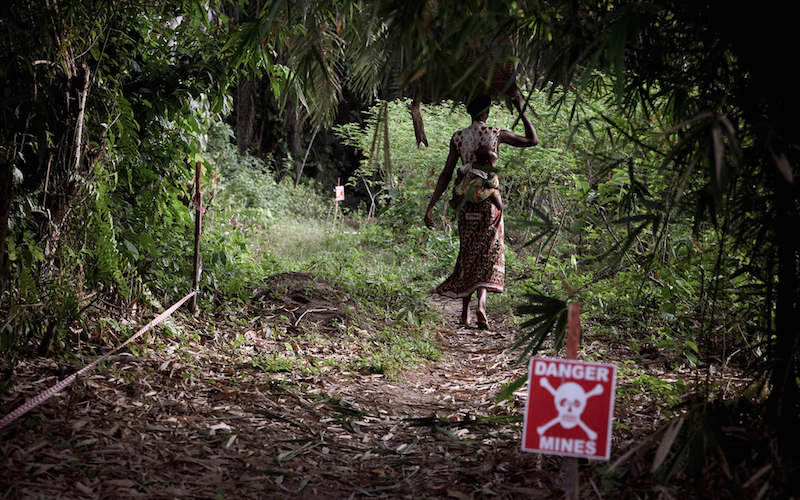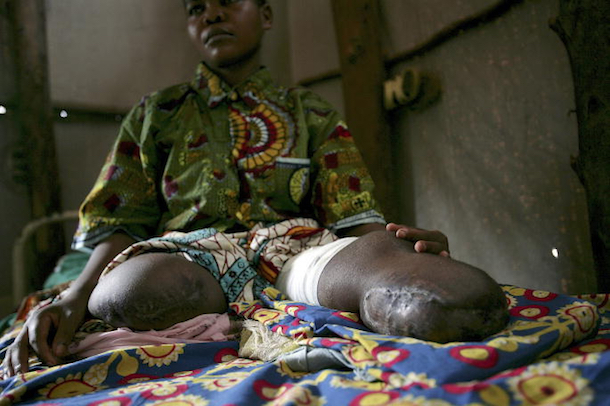
The Democratic Republic of the Congo: An Eternal War Zone
The Democratic Republic of the Congo (DRC) has never gotten a break – it has suffered one humanitarian or political crisis after another and has been fraught with civil war and corruption for decades.
The 5-year conflict, lasting from 1998 to 2003, between the DRC, Angola, Namibia, Zimbabwe, Rwanda, and Uganda has been termed “Africa’s World War” and no one has paid more dearly for this war than the Congolese citizens themselves – almost six million people died, either as a direct consequence of war or because of disease and malnutrition resulting from the devastation. Over 19,000 UN Peacekeepers are stationed in the DRC, making it the largest Peacekeeping mission in the world.
Even though this war is now over a decade old, the eastern region of the nation is the most weakened, with the M23 rebel group at the forefront of the violence. M23, however, is neither the first nor the only organization that seeks to bring down the Congolese government.
In 2008, the National Congress for the Defense of the People (CNDP), backed by both Rwanda and Tutsi fighters, stormed Goma, a message that forced the Congolese president, Joseph Kabila, to form the peace deal of 2009, in which the CNDP and multiple other militias agreed to disband and join the national army (FARDC).
Backed by strong public support of his actions to reduce the violence in the DRC’s eastern regions, Joseph Kabila was re-elected as president in 2011.
Early in 2012, he sought to extradite multiple leaders of the CNDP group, most notably Bosco Ntaganda, who was accused of war crimes and crimes against humanity. Unfortunately, these actions were not without their consequences.
In April 2012, thousands of soldiers in the national army defected to their original cause, renaming it “M23” as a reminder of the date that the peace deal was originally signed; they claimed that by going after Ntaganda, the government had not upheld their side of the deal.
Since then, M23 focused on destabilizing eastern DRC, with the financial help of the Rwandan government. Rather than indiscriminate bombings that result in civilian casualties, which are common in the Middle East, particularly in Syria, M23 members used rape to punish women, humiliate men and communities, and to warn any potential enemies of the measures they will take to continue their fighting. The UN High Commissioner for Human Rights, Navi Pillay, said, “The leaders of the M23 figure among the worst perpetrators of human rights violations in the DRC, or in the world for that matter.”

Since MONUSCO, the UN Peacekeeping Mission in the DRC, was seen to have failed after years of expense and loss of life without substantial results, the UN Security Council created the Force Intervention Brigade (FIB) in March 2013, with a mandate to continue stabilizing operations and neutralize armed insurgencies until March 31, 2014. Comprised of over 3,000 soldiers from Malawi, Tanzania, and South Africa, the FIB disarmed and defeated the M23 insurgency in November 2013, after a series of offensive operations. In addition to peacekeeping, the FIB sought to reestablish Congolese authority in the vacuum of eastern DRC, by empowering the security sectors, particularly the military, which was seen by many as incapacitated and incompetent. Thus, in their year-long mandate, FIB was able to achieve considerable success.
However, even though the FIB mandate has expired, the DRC has a long way to go before it can be classified as stable. The conflict is now concentrated in the Kivu region of eastern DRC, both in North Kivu and South Kivu. At the epicenter of the region is Goma, a hot spot for insurgencies with easy access to Rwandan funds and arms. The two main rebel groups concentrated in the Kivu region are Rwandan Hutu rebels and Ugandan rebels. Unfortunately, a planned UN-Congo intervention to defeat the remaining Hutu rebels fell apart in early 2015, because of UN criticism of human rights violations in the Congolese military and Kabila’s constant push to reduce the UN Peacekeeping force in the DRC.
Financial rewards for both insurgent groups and their supporters as well as the inability of Joseph Kabila to stop the insurgency fuel conflict at an exponential rate. The DRC possesses immense natural resources that rival those of any other nation in the region – diamonds, cobalt, and copper just to mention a few. Systemic corruption and the incompetency of security forces have enabled an illicit mineral trade that supporters profit from, profit that fuels even greater and more violent conflict. Joseph Kabila’s reluctance to step down after his constitutionally-limited two terms end in 2016 creates another hot spring of political instability that violent insurgencies thrive on.
So where does the DRC fall on the international scale, in spite of conflicts around the world? The Failed State Index (FSI) 2013 ranks the DRC second only to Somalia by less than three points, a difference most likely attributed to Somalia’s terrorist group, al-Shabaab. The DRC ranks last on the UN Human Development Index and in terms of GDP per capita while remaining in the bottom of Transparency International’s Corruption Perceptions Index and the Heritage Foundation’s Index of Economic Freedom. Analysts have claimed that “If there is a prize for the worst place on Earth, Congo has a strong claim.”
If that seems ugly now, eventually the DRC must be able to maintain some semblance of stability without intervention from outside nations and the UN. As the terrorist threat in Africa continues to mount and illicit economies prosper, the DRC enters a slow decline thus turning into a failed state. The collapse of the DRC would have a domino effect, with consequences rippling across fragile African nations.
If the DRC wants to set up a democracy that can survive, it needs to honor its constitution and the agreements it has made to preserve peace. That means that Joseph Kabila should step down and endorse a government that can adequately combat the human rights violations carried out by both the army and the various insurgencies. It also means that border security must be a top priority for the next government to prevent smuggling of weapons from Rwanda and Uganda and to halt the illicit mineral trade. While these may seem like lofty goals, without achieving them, the DRC can only move backward.

